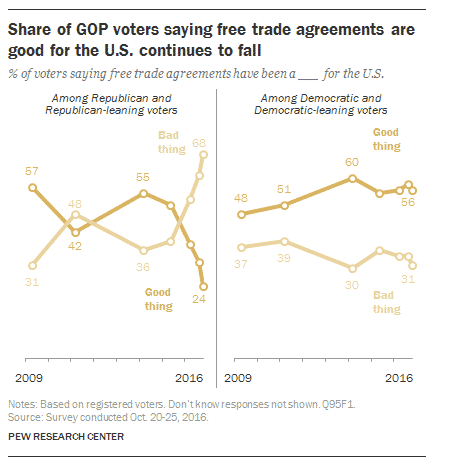One of the things that has been most rapidly “normalized” about the Trump administration is its economic nationalism. Trump just is an economic nationalist. In fact as Laderman and Simms have shown he has been a mercantilist since the 1980s, viewing America as locked in battle with foreign competitors, first Japan and Germany, now China and Mexico (and Germany). But if this is true, it begs the question of how a mercantilist of his ilk could have become a Republican president. In the discussion of Trump’s electoral base, the “white working class” question etc, the question of his protectionism has been rather underemphasized. This is suggested by a combination of reading Mike Davis excellent piece on Trump’s victory in Jacobin https://www.jacobinmag.com/2017/02/the-great-god-trump-and-the-white-working-class/ on top of a lot of polling data on shifting American attitudes to trade policy.
Train of thought goes like this:
(1) If we agree with Davis that winning midwestern swing-states was one of keys to Trump’s victory.
(2) Then we can also agree that the political battle in those states was one-sided because Clinton’s campaign failed to show up. See this blistering attack on the Clinton campaign’s lack of economic appeal from Stan Greenberg the original architect of the strategy that won the Reagan Democrats back to Bill Clinton in 1992. http://www.thedailybeast.com/articles/2016/11/29/how-macomb-county-created-and-killed-the-clinton-machine.html
(3) But, it was one-sided also because Trump ran as a Republican, making all the Republican appeals, but, crucially, he ran as a Republican who was not “free trade” but a “trade warrior”. You were not supposed to be able to do that.
(4) This Trumpian rejection of “free trade” and his espousal of an aggressive trade strategy marks a major historic break in the history of the Republican party. There hasn’t been an economic nationalist of Trump’s ilk at the helm for the Republicans since the interwar period.
(5) Explaining this shift implies the need for some kind of story about struggles either between Republican elites, or between base(s) and elite(s).
(6) It begs the question of what new bargain is holding the Trump coalition together, if indeed there is one.
The Republican shift on trade policy is truly spectacular. It is not a shift to isolationism. Republicans, like most Americans, think trade could be good for the US. Since Trump took office they seem even more confident that it will be in future. But from 2015 onwards they began to develop a harshly negative view of “actually existing free trade” i.e. NAFTA and a world in which China traded on its version of WTO rules. Data from Pew/Harvard and other places record a truly dramatic shift – 30 point swing on a key issue in a matter of 2 years.
Below three charts that show the shift: the Pew data captures the new hostility to trade treaties. The Gallup question captures the buoyant attitude to trade as a means of expanding US economy, a faith apparently animated by confidence in a trade warrior President. (Gallup has this explanation from 2016 about the discrepancy between people’s views about trade in general and free trade treaties in particular. http://www.gallup.com/opinion/polling-matters/190427/american-public-opinion-foreign-trade.aspx)
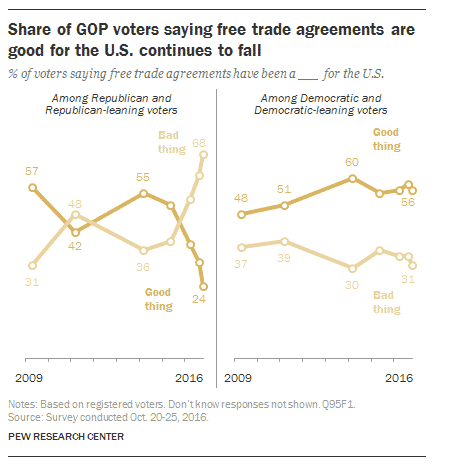
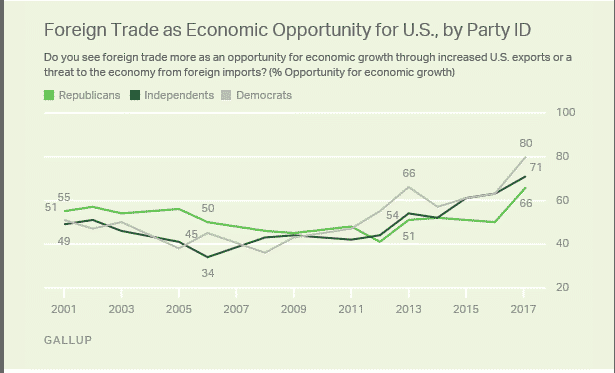
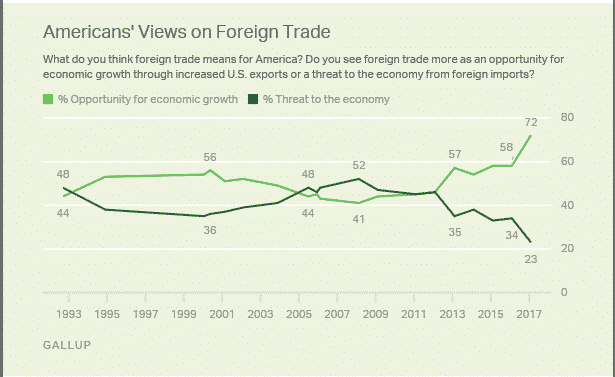
http://www.gallup.com/poll/204044/record-high-foreign-trade-opportunity.aspx
Was this a reflection of “realities on the ground” i.e. the heavy impact of globalization in some industrial communities? Was it driven by a broad-based move amongst think tanks to reevaluate trade policy? Did it reflect a shift in who the Republicans “are”, or thought themselves to be? Was it driven by Trump himself and the mercantilist view of trade policy he has upheld since the 1980s (Laderman and Simms)?
Certainly pollsters connected to Fox and Breitbart were on the case early. They were picking up signs of massive discontent regarding “elite” control of trade policy. With Fox and Breitbart backing, Pat Caddell argued that a true insurgent Republican should come out forcefully against TPP. https://getliberty.org/wp-content/uploads/2016/03/Pat-Caddell-ALG-TPP-Poll-Charts-3-10-16.pdf
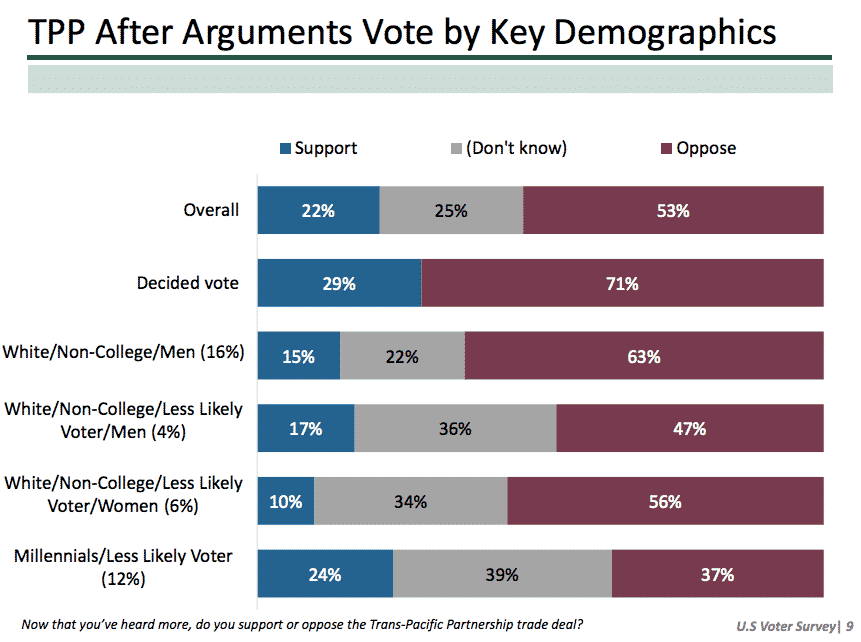
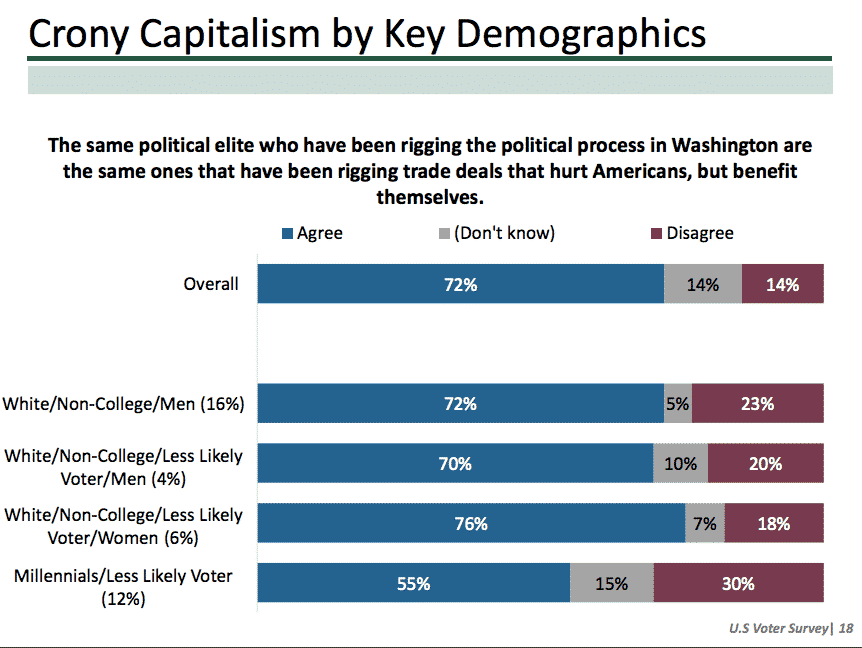
As the momentum for a change built up, it involved a reshuffling of positions and influence within the Republican leadership. Already in 2015 pressure was building on mainline, free trade republicans to shift their positions. http://nationalinterest.org/feature/confused-coalitions-republicans-democrats-free-trade-14257
By 2016 the pressure was overwhelming. http://www.politico.com/story/2016/09/gop-senators-trade-228403
One could interpret this as a struggle between the middle class mass base of the party against the globalized elites, as Charlie Post does here https://www.jacobinmag.com/2016/10/trump-gop-republicans-tea-party-populism-fascism/. Alternatively, one could interpret it as a battle between different factions of the elite, those who are more or less committed to globalization, or to different versions of globalization.
One is left wondering, whether there is a new bargain holding the Trump coalition together. If so, might one imagine it as a return to the coalition that Richard Bensel sketched for the classical era of Republican protectionism from the Civil War to 1913 and the Underwood Tariff.
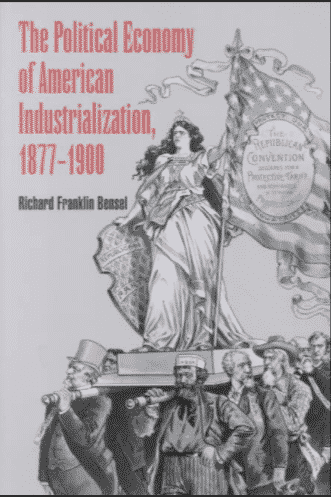
In Bensel’s narrative, protectionism was part of a bargain necessary to ensure Congressional backing for the gold standard favored by New York money and North Eastern big business. By analogy might one argue that in Trump’s case protectionism (along with racism and Islamophobia), which are unpopular and dysfunctional from the point of view of big business but welcomed by the Republican base, buy support for an administration that delivers the evisceration of Dodd-Frank to Wall Street and the gutting of the EPA to coal and oil, plus countless other benefits as yet to be revealed? If this were to be the case, it would fall short of the full neoliberal package, but it might prove to be a viable long-term alternative to the Clinton-Rubin-Obama continuity.
